|
|
|
Sort Order |
|
|
|
Items / Page
|
|
|
|
|
|
|
| Srl | Item |
| 1 |
ID:
144303
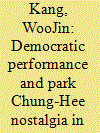

|
|
|
|
|
| Summary/Abstract |
Why, a quarter century after democratization, are Korean citizens so nostalgic about the former authoritarian Park Chung-hee government? What are the implications of this support for Korea's democratic deepening? To answer these questions, I offer empirical analyses of selected data from the Korea Democracy Barometer 2010 survey that confirm the relevance of two dimensions of political support to authoritarian nostalgia in Korea: the life biography model and the economic performance model at the system level. The results suggest a double-sided phenomenon: on the one hand, nostalgia based on a retrospective collective memory; on the other, citizens' critical view of the performance deficits of post-Park democratic governments in dealing with inequality in Korean society. As the findings elucidate, in spite of the challenges they face, emergent democratic governments must perform more effectively if they are to win citizens' support.
|
|
|
|
|
|
|
|
|
|
|
|
|
|
|
|
| 2 |
ID:
147051
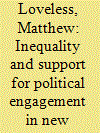

|
|
|
|
|
| Summary/Abstract |
Existing studies of income inequality and political participation—including related literature, for example, on preferences for redistribution—leave us with the question of whether citizens see political democracy as offering ways to challenge market inequalities. Using original surveys in 13 Central and Eastern European countries, I find that those who see high and undesirable levels of income inequality have stronger demands for popular democratic participation than those who do not. In addition, neither the aggregate levels of support for political engagement nor individuals’ perceptions of inequality are coordinated with either national-level indicators of income inequality or democratic performance.
|
|
|
|
|
|
|
|
|
|
|
|
|
|
|
|
| 3 |
ID:
133945
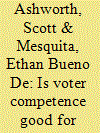

|
|
|
|
|
| Publication |
2014.
|
| Summary/Abstract |
A long research tradition in behavioral political science evaluates the performance of democracy by examining voter competence. This literature got its start arguing that voters' lack of information undermines a defense of democracy rooted in electoral accountability. A more recent literature deepens the debate, with some authors claiming that voters effectively use cues to substitute for information about candidates and policies, and other authors claiming that voters are insufficiently rational to do so. We argue that, regardless of its conclusions about voter competence, this literature's single-minded focus on voter behavior is misguided. We use a sequence of formal models to show that traditional intuitions are incomplete because they ignore the effect that changes in voter behavior have on the equilibrium behavior of politicians. When this strategic interaction is taken into account, increases in voter information or voter rationality sometimes make democratic performance better and sometimes make democratic performance worse. One simply cannot assess the implications of voter characteristics for democratic performance without also studying how those characteristics affect the behavior of politicians.
|
|
|
|
|
|
|
|
|
|
|
|
|
|
|
|
| 4 |
ID:
184425
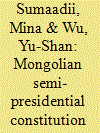

|
|
|
|
|
| Summary/Abstract |
While earlier studies of Mongolian democracy focused on actor-based explanations for its success, this study discusses the previously less examined role of Mongolia’s semi-presidential constitution in the process of democratization. It examines how the semi-presidential political system in Mongolia evolved since 1992 and offers an in-depth examination of the Mongolian semi-presidential form of government institutionalized by the 1992 constitution and its subsequent amendments. Based on this, it also addresses the question of whether the Mongolian semi-presidential constitution was a weakness or a strength to democratization. This study argues that at an early stage when the political forces were learning the rules of the game, the constitution was an overall positive influence on democratization. Moreover, the main weaknesses linked to the constitutional design were more likely to be related to weak institutional control mechanisms that could be resolved at a lower level legal framework.
|
|
|
|
|
|
|
|
|
|
|
|
|
|
|
|
| 5 |
ID:
157531
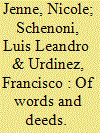

|
|
|
|
|
| Summary/Abstract |
The idea of an integrated Latin American region goes back to the early post-independence period, and yet, in substance, Latin American regionalism has remained far behind its stated aims. The perceived implementation gap has raised the question why policymakers continued to talk about something they appeared to avoid in practice. This article contributes to the debate on Latin America’s integration gap by exploring the phenomenon of declaratory regionalism - the practice of referring to the region and its institutions in political speeches. Based on quantitative text analysis of the speeches presidents delivered annually at the UN’s General Assembly between 1994 and 2014, we show that this practice has not been uniform. Presidents distinguish between different forms of regionalism, integration and cooperation, and frame the geographical region they refer to accordingly. In motivating presidents to speak about integration as opposed to cooperation, ideology and democratic performance stand out as crucial factors.
|
|
|
|
|
|
|
|
|
|
|
|
|
|
|
|
|
|
|
|
|